Coffee break story.☕ Some of you may have seen the Ridley Scott film The Last Duel and wondered how true the story is.
☕Coffee break story.☕
Some of you may have seen the Ridley Scott film The Last Duel and wondered how true the story is.
On December 29, 1386, before a huge crowd headed by French King Charles VI, former friends Jean de Carrouges and Jacques Le Gris met on a field for a highly publicised duel. Jean de Carrouges’ wife, Marguerite, who had accused Le Gris of raping her, watched from the crowd; her husband’s defeat would be seen as proof that she had lied not only about the attack but also during the trial.
Her husband’s death during the duel would not only vindicate her violator but would also ensure her execution by burning at the stake for the crime of bearing false witness. But how did these two friends come to face each other in a trial by combat?
The two had met while both in the service of Count Pierre d’Alencon; Carrouges was from a noble Norman family, and Le Gris was lower-born. Carrouges was elevated to higher positions, while Le Gris, a favourite of Count Pierre, rose within his service. The friends fell out when Carrouges petitioned the King for the return of lands that had once belonged to the father of his new bride, Marguerite.
The lands had been bought by Count Pierre, and Le Gris was heavily involved with the proceedings. After three years of legal struggles, Carrouges petition was denied, and he was isolated from the court. Angry and frustrated, Le Gris became the focus of his ire.
Jean de Carrouges departed on a campaign to Scotland in 1385 as part of France's Auld Alliance with Scotland, returning a year later, knighted but ill and bankrupt. A confrontation took place between the two friends, but it is not known over what or what was said. An angry Carrouges left for Paris.
According to the testimony, with her husband in Paris, Marguerite was left alone with just one maidservant. On January 18th, she opened the door to find Louvel, a servant of Le Gris. He had asked to be let in to warm himself by the fire. Louvel reportedly told her that "The squire loves you passionately; he will do anything for you, and he greatly desires to speak to you."
Marguerite attempted to rebuke Louvel, only to turn around and see Le Gris, who had entered through the unlocked door. The encounter turned violent, with Louvel restraining her while Le Gris assaulted her. After the attack, she claimed he told her:
"Lady, if you tell anyone what has happened here, you will be dishonoured. If your husband hears of it, he may kill you.
Say nothing, and I will keep quiet, too."
When Carrouges returned home three or four days after the attack, she waited until the two were alone before revealing what had happened and urging her husband to seek vengeance against Le Gris.
Medieval law treated rape as a horrific crime on par with other capital offences.
But conceptions of rape varied widely, with some commentators arguing that women enjoyed being taken by force and others accusing survivors of falsely accusing men in order to trick them into marriage.
It was viewed as a property crime against the victim’s husband or guardian, and the perpetrators often avoided harsh penalties by paying a fine to the man in question. The burden of proof lay almost entirely on the victims, who had to prove they’d resisted their attacker’s advances while recounting their testimony in precise detail.
Even a small mistake, such as misstating the day the attack happened, could result in the case being thrown out and the victim being punished for perjury. Women did not bring these sorts of cases to the public's attention lightly.
Initially, Carrouges brought Marguerite’s case to Count Pierre. Given the count’s strong relationship with Le Gris and combative past with Carrouges, he was quick to dismiss the claim, even arguing that Marguerite "must have dreamed it." Undeterred, Carrouges raised an appeal with the King.
French law stipulated that noblemen appealing their cause to the King could challenge the accused to a judicial duel or trial by combat. Known as the "judgement of God," these ordeals were thought to have a divinely ordained outcome, with the loser proving his guilt by the very act of defeat.
After hearing both parties, a duel was authorised.
Although there is no official account of the duel itself, several contemporary accounts from some of those present do survive.
The duel started on horseback; at the first and second charges, their lances each struck the other's shield but did not cause significant damage.
On the third charge, the lances shattered, and the knights closed on one another with battle axes drawn and traded furious two-handed blows. Le Gris' axe severed the spine of Carrouges' horse. Carrouges barely leapt clear of the falling horse and thrust his own axe's pike deep into the stomach of Le Gris' steed. Le Gris was thrown off and lost his axe.
He rose and drew his longsword, turning to meet Carrouges, who was already advancing on him, sword also drawn. They traded blows, and Le Gris' superior strength gave him an advantage, pushing Carrouges back before thrusting his blade through his opponent's thigh. Perhaps overconfident, Le Gris stepped back to watch his wounded enemy and was thrown to the ground when the desperate Carrouges hurled himself forward.
Although Le Gris' plate armour was too thick to allow Carrouges' weapon to penetrate, it was also so heavy that he could not get back on his feet. Stranded on the ground, Le Gris struggled as Carrouges straddled him and used his sword to smash open the lock on Le Gris' faceplate.
As the crowd watched in silence, Carrouges shouted at Le Gris to confess his crime before death or face Hell. Le Gris replied so all could hear, "In the name of God, and on the peril and damnation of my soul, I am innocent of the crime." Enraged, Carrouges drew his misericorde and thrust it through Le Gris' throat, killing him instantly.
The crowd cheered as the Executioner of Paris took charge of Le Gris’ body. Having been found guilty of his crime, Le Gris’ body was stripped of its armour and clothing and dragged through the streets to the Gibbet of Montfaucon. There, it was strung up alongside the bodies of murderers and thieves to rot before eventually being flung into a common grave.
Not only did Carrouges victory save his and his wife’s lives, it brought him great wealth from the King and fame. Carrouges died roughly a decade after the duel, falling in combat at the Battle of Nicopol. Marguerite’s fate is unknown; those convinced of the falsity of her claims suggest she retired to a convent out of shame.
Picture of a miniature of Le Gris and Carrouges' duel, as depicted in a medieval illuminated manuscript in the British Library
Sources:
https://www.smithsonianmag.com
The Last Duel: A True Story of Crime, Scandal, and Trial by Combat in Medieval France, by Eric Jager, p. 170, 172, 175, 179, 184
https://uts.nipissingu.ca/muhlberger/FROISSART/RELIG3E.HTM
https://www.britannica.com


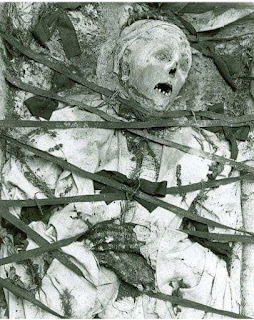
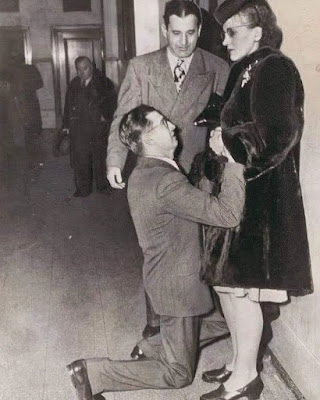
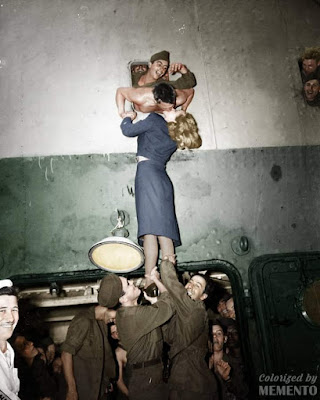


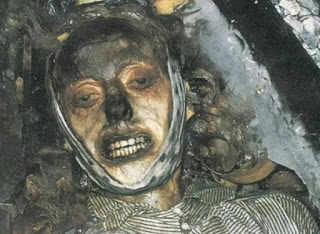
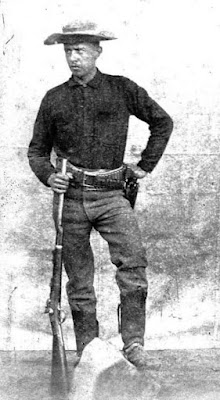


Comments
Post a Comment